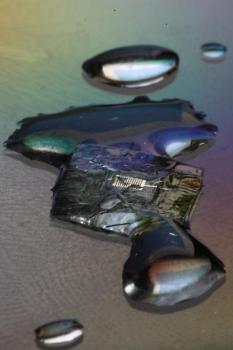Researchers at the University of Illinois have developed biocompatible electronic devices which are completely soluble in water.
 A new generation of transient electronic devices function in water but dissolve when their function is no longer needed. CREDIT: J.Rogers/UIUC
A new generation of transient electronic devices function in water but dissolve when their function is no longer needed. CREDIT: J.Rogers/UIUC
This breakthrough could lead to the creation of a new range of devices which disappear after use, such as electroceutical therapies, green consumer electronics and biomedical sensors.
The research was led by John A Rogers’ research team at the Frederick Seitz Materials Research Laboratory of the Department of Materials Science and Engineering.
The applications being explored by the team surpass the scope of currently available semiconductor technologies.
The potential applications of this new class of technology include: bioresorbable devices which minimise infection at a surgical location, temporary implantable systems including electrical brain monitors that identify traumatic injuries and electrical simulators that stimulate the growth of bones.
Devices which aid in programmed drug delivery can also be designed using this new technology.
These applications are made possible by using devices with strong, reliable, high performance operation for a known period of time.
After completing its function, the devices disintegrate by a resorption process, avoiding surgical operation to remove them from the body.
Our most recent combined developments in devices that address real challenges in clinical medicine and in advanced, high volume manufacturing strategies suggest a promising future for this new class of technology.
John A Rogers, Frederick Seitz Materials Research Laboratory